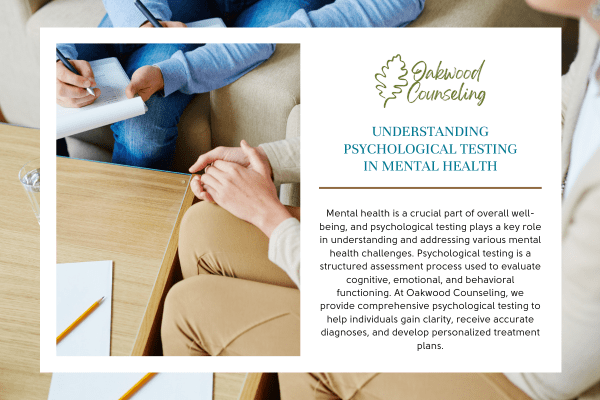Attention-Deficit/Hyperactivity Disorder (ADHD) is a common neurodevelopmental condition that affects children, adolescents, and adults. It can impact focus, impulse control, organization, and daily functioning. However, receiving an accurate diagnosis is the first step toward effective treatment. At Oakwood Counseling, our ADHD testing services provide individuals with the clarity they need to understand their challenges and explore treatment options.
What is ADHD Testing?
ADHD testing is a comprehensive psychological assessment used to determine whether an individual meets the criteria for Attention-Deficit/Hyperactivity Disorder. This process involves multiple methods, including clinical interviews, behavioral observations, and standardized assessments to ensure an accurate diagnosis.
ADHD testing helps differentiate ADHD from other conditions that can present similar symptoms, such as:
- Anxiety disorders
- Depression
- Learning disabilities
- Autism spectrum disorders
- Sleep disorders
Since these conditions can overlap, a thorough evaluation is necessary to provide the right diagnosis and create an effective treatment plan.
Signs That ADHD Testing May Be Needed
Individuals with ADHD often struggle with specific behaviors that interfere with daily life. Common signs include:
- Inattention: Difficulty focusing, frequent distractions, forgetfulness, and problems following instructions.
- Hyperactivity: Constant movement, fidgeting, trouble staying seated, and excessive talking.
- Impulsivity: Interrupting conversations, acting without thinking, difficulty waiting turns, and poor self-control.
For children, these symptoms may be evident in school performance, while adults might experience difficulty managing work responsibilities, finances, or personal relationships. If these challenges are affecting daily life, seeking an ADHD evaluation can provide the answers needed for proper support and treatment.
The ADHD Testing Process
The ADHD testing process is designed to provide a clear and accurate diagnosis. Here’s what to expect:
1. Initial Consultation
A therapist near you will conduct an in-depth discussion about symptoms, medical history, and any concerns related to attention and behavior.
2. Standardized ADHD Assessments
We use clinically validated tools such as behavioral rating scales, cognitive assessments, and attention-based tests to measure ADHD-related symptoms objectively.
3. Clinical Observation and Interviews
Therapists will observe behavior patterns and may conduct interviews with parents, teachers, or partners to gain a broader understanding of how symptoms manifest in different environments.
4. Comprehensive Evaluation and Diagnosis
After analyzing the collected data, our specialists provide a comprehensive diagnosis and discuss the results with the individual and their family (if applicable).
5. Personalized Treatment Plan
If ADHD is diagnosed, a personalized treatment plan is developed, which may include therapy, behavioral strategies, and lifestyle adjustments to improve focus and overall functioning.
Benefits of ADHD Testing
1. Gaining Clarity and Understanding
ADHD testing provides individuals and families with clear answers about attention-related challenges. An accurate diagnosis helps explain difficulties experienced in school, work, or relationships.
2. Creating Effective Treatment Strategies
Once ADHD is diagnosed, treatment strategies such as cognitive-behavioral therapy (CBT), executive functioning coaching, and behavioral interventions can be implemented to improve daily life.
3. Differentiating ADHD from Other Conditions
Many conditions, including anxiety, depression, and learning disabilities, share symptoms with ADHD. Testing helps ensure that individuals receive the right diagnosis and treatment.
4. Improving Self-Esteem and Relationships
Understanding an ADHD diagnosis allows individuals to develop self-awareness and confidence. With the right support, they can improve relationships, communication, and self-management skills.
Age Range for Testing
We can evaluate children as young as three years old to potentially diagnose Autism Spectrum Disorder or other types of developmental disorders. For just about every other diagnose, we consider six years to be the age at which we can evaluate and diagnose mood, anxiety and attention disorders in children with greater reliability. Our psychologists are happy to visit with you to explore whether an assessment is the best option for your child.
Treatment Options After an ADHD Diagnosis
At Oakwood Counseling, we focus on therapy-based interventions, behavioral coaching, and lifestyle modifications. Our treatment options include:
- Therapy and Counseling: Cognitive-behavioral therapy (CBT) and coaching to develop executive functioning skills.
- Mindfulness and Stress Management: Techniques to improve focus and emotional regulation.
- Parental Guidance and Family Support: Helping families understand ADHD and implement strategies at home.
- Workplace and Academic Accommodations: Guidance on obtaining necessary support in school or work environments.
Let Us Help
If you or a loved one are experiencing attention difficulties, ADHD testing can provide the clarity needed for effective treatment. At Oakwood Counseling, our team of professionals is here to support your journey toward better focus and well-being.
ADHD can present challenges, but with the right diagnosis and treatment plan, individuals can thrive. If you suspect ADHD in yourself or a loved one, don’t hesitate to seek professional evaluation. Contact Oakwood Counseling today to schedule an ADHD assessment and begin the path toward greater focus and productivity.






